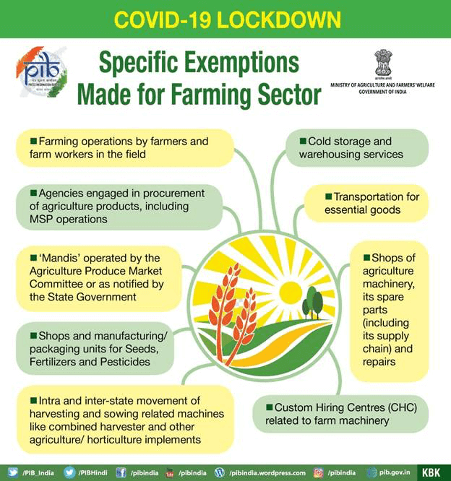April 29th, 2020 PIB:- Download PDF Here
TABLE OF CONTENTS
1. Ministry of Agriculture and Farmers’ Welfare 2. National Infrastructure Pipeline (NIP) 3. Electrostatic Disinfection Technology 4. Alzheimer’s disease
1. Ministry of Agriculture and Farmers’ Welfare
Context:
To ensure that there is no shortage of food grains in the country during the lockdown period, the Ministry has made certain exemptions to the farming community.
Details:
- The exemptions made for farming during the lockdown are:
- Farming operations by farmers and farm workers in the field;
- Agencies engaged in procurement of agriculture products, including MSP operations;
- ‘Mandis’ operated by the Agriculture Produce Market Committee (APMC) or as notified by the State Government;
- Shops and manufacturing/packaging units for Seeds, Fertilizers and Pesticides;
- Intra and inter-state movement of harvesting and sowing related machines like combined harvester and other agriculture/horticulture implements;
- Cold storage and warehousing services;
- Transportation for essential goods;
- Shops of agriculture machinery, its spare parts (including its supply chain) and repairs;
- Custom Hiring Centres (CHC) related to farm machinery.
- The technology initiatives of the Department of Agriculture, Cooperation and Farmers’ Welfare include:
- New modules were launched in e-NAM.
- e-NAM integrated with e-NWR: Warehouse based trading module in e-NAM software to facilitate trade from warehouses based on e-NWR (Electronic Negotiable Warehouse Receipts).
- FPO module which enables uploading of produce, bidding and payment from their Collection Centres directly.
- KISAN RATH App launched: Read more on PIB dated 17th April, 2020.
- All India Agri Transport Call Centre was launched in April, 2020. This Call Centre has been set up for coordination between States for inter-state movement of perishables like vegetables & fruits, agriculture inputs.
- The government has launched the Kisan Credit Card (KCC) Saturation Drive in February 2020 for ensuring benefits of KCC to PM-KISAN
- The Pradhan Mantri Fasal Bima Yojana has been made voluntary for all farmers considering the demand of farmers while there is no change in farmers’ share of premium.

2. National Infrastructure Pipeline (NIP)
Context:
The Task Force on National Infrastructure Pipeline (NIP) submitted its Final Report on NIP for FY 2019-25 to the Union Minister for Finance & Corporate Affairs.
About NIP:
- NIP is a first-of-its-kind, whole-of-government exercise to provide world-class infrastructure across the country, and improve the quality of life for all citizens.
- It aims to improve project preparation, attract investments (both domestic and foreign) into infrastructure, and will be crucial for achieving the target of becoming a $5 trillion economy by FY 2025.
- The NIP has been made on a best effort basis by aggregating the information provided by various stakeholders including line ministries, departments, state governments and private sector across infrastructure sub-sectors identified in the Harmonised Master List of Infrastructure.
- To draw up the NIP, a bottom-up approach was adopted wherein all projects (Greenfield or Brownfield, Under Implementation or Under Conceptualisation) costing greater than Rs 100 crore per project were sought to be captured.
- The final report identifies and highlights recent infrastructure trends in India as well as global in all sectors of infrastructure.
- It also captures sector progress, deficits and challenges. In addition to update existing sectoral policies, the Final Report also identifies and highlights a set of reforms to scale up and propel infrastructure investments in various sectors throughout the country.
- The report also has suggested ways and means of financing the NIP through deepening Corporate Bond markets, including those of Municipal Bonds, setting up Development Financial Institutions for infrastructure sector, accelerating Monetisation of Infrastructure Assets, Land monetisation, etc.
- The Task Force has recommended that three Committees be set up:
- A Committee to monitor NIP progress and eliminate delays;
- A Steering Committee in each infrastructure ministry level for following up implementation; and
- A Steering Committee in DEA for raising financial resources for the NIP.
- The NIP project database would be hosted on the India Investment Grid (IIG) to provide visibility to the NIP and help in its financing with prospective investors; domestic and foreign, able to access updated project level information.
- Each line Ministry/State would further add new projects and update their respective project details at pre-defined time intervals so that updated data is available to prospective investors.
3. Electrostatic Disinfection Technology
Context:
Electrostatic Disinfection Technology transferred for commercialization.
Details:
- CSIR-Central Scientific Instruments Organisation (CSIR-CSIO), Chandigarh, has designed and developed an innovative technology for effective disinfection and sanitization to fight the coronavirus pandemic.
- CSIR-CSIO has transferred this technology to a Nagpur-based company, Rite Water Solutions Pvt. Ltd., for commercialization and large-scale production.
- This technology has been found very efficient and effective to stop the spread of coronavirus and pathogens.
- Electrostatic Disinfection Machine is developed based on the electrostatic principle.
- It produces uniform and fine spray droplets of disinfectants in the size range of 10-20 micrometre to kill microorganisms and viruses.
- Due to the small size of droplets, the surface area of spray droplets increases thereby enhancing the interaction with harmful microorganisms and coronavirus.
- The machine uses very less disinfection material as compared to conventional methods, which helps to save natural resources with negligible increase of chemical waste in the environment.
Context:
JNCASR scientists develop a natural product based Alzheimer inhibitor.
To know more about Alzheimer’s disease, which is the most prevalent neurodegenerative disorder and accounts for more than 70% of all dementia, check CNA dated Feb 19, 2019.
April 29th, 2020 PIB:- Download PDF Here
| Related Links | |||
| UPSC 2020 | Government Exams | ||
| UPSC Current Affairs Quiz | UPSC Prelims Exam | ||
| UPSC Monthly Magazine for Current Affairs | IAS Eligibility | ||
Read more PIB articles here.

Comments